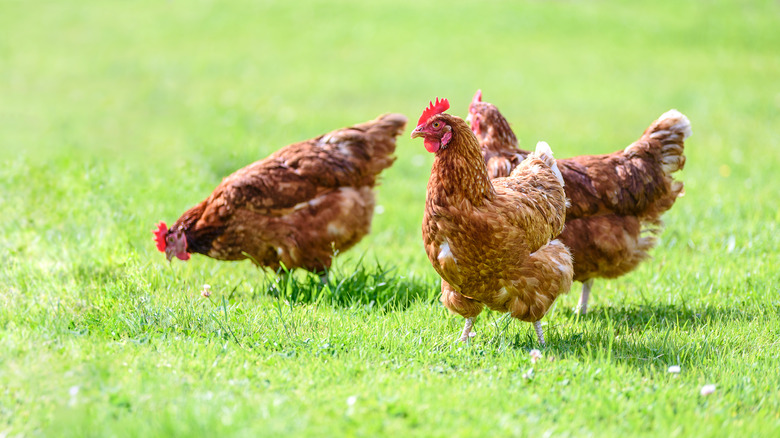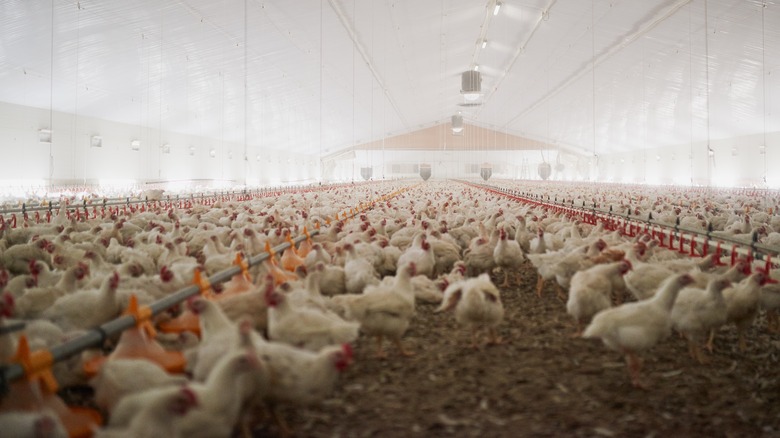A Proposed Government Ruling Could Change The Organic Egg Industry
Eggs are an American favorite, with the average citizen consuming upwards of 280 per year (via Statista). And, for the discerning egg shopper, there are all kinds of labels to look for at the supermarket, from free-range to cage-free to pasture-raised to certified humane. These different categories could indicate that the chickens that laid those eggs enjoyed a higher quality life or better diet than chickens delivering standard supermarket eggs. And, consumers are willing to pay more for these types of eggs, with organic eggs typically costing around $2 more per dozen than conventional (via Everyday Health).
If you're the type of shopper who prefers to buy organic eggs, it might be worth it to you to spend more, as free-range and organic eggs have been proven to contain higher levels of omega-3 fatty acids and vitamins A and E (via Penn State University). But, especially if you're laying down extra cash, you'll want to be assured that you're getting what you pay for, because according to Humane Facts, the term "free range" is not actually regulated by the U.S. Department of Agriculture (USDA) when it comes to egg-laying hens. The site reports that due to loopholes, birds can be raised almost entirely indoors and with their eggs still being labeled "free range" even if the birds only have outside access for a few minutes per day. And, those are loopholes that the Biden administration announced yesterday that it wants to close up.
Make outdoor access for hens necessary
If you were a big egg-producing corporation, it might be in your best interest to market "organic" eggs at a higher price — while filling cartons with conventionally produced eggs laid by indoor hens with little access to the outdoors. Although shady, that's exactly what many egg producers have been doing for years, according to a Reuters article published on August 9, 2022. Due to loopholes caused by the fact that the USDA doesn't regulate the term "free range" as it applies to egg-laying hens, producers have been able to label their eggs as organic by following half measures at their facilities, such as confining hens to a warehouse with a single exit and opening the door for just a few minutes per day (via Humane Facts), or installing open-air porches on henhouses instead of providing access to actual pasture (via Reuters).
By doing so, egg producers are able to make extra money by charging a higher price for their so-called free-range eggs, with the hens that laid them actually raised in a lower-cost warehouse environment. But, on August 9, 2022, the Biden administration announced an intention to close those loopholes, by making it a requirement that egg producers who seek the "organic" label allow their hens access to true pasture in order to qualify for it. Before the proposal can be implemented, the public has 60 days to make comments.
A similar rule was proposed under the Obama administration
A similar rule governing the more humane production of eggs went into effect in 2017 under the Obama administration, as reported by Reuters. But, the rule was opposed by the nation's largest egg producer, Michigan-based Herbruck's Poultry Ranch, and also by the key farm-state Senator Debbie Stabenow of Michigan. The rule was withdrawn later in 2017, after Donald Trump took office.
Granting egg-laying hens true access to the outdoors is considered a far more humane way of raising birds, Reuters noted. The goal of the rule proposed yesterday by the USDA is "to have unambiguous standards," the department's Under Secretary for Marketing and Regulatory Programs Jenny Moffitt told Reuters, and to bring the term "organic" as it applies to eggs more in line with consumer expectation of what the word means. If passed, egg producers would have a lengthy 15 years to adapt their facilities to comply with the rule, which Tom Chapman, CEO of the Organic Trade Association, told Reuters is "the first significant movement on organic animal welfare in years."


